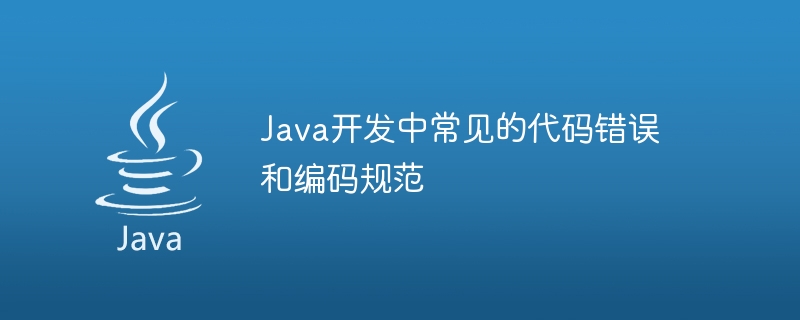Home >Java >javaTutorial >Common coding errors and coding standards in Java development
Common coding errors and coding standards in Java development
- WBOYWBOYWBOYWBOYWBOYWBOYWBOYWBOYWBOYWBOYWBOYWBOYWBOriginal
- 2023-10-09 10:57:031317browse

Java is a programming language widely used to develop various types of software. However, due to its complex syntax and features, developers often encounter various coding errors and coding standard issues. . This article will introduce common coding errors in Java development and provide specific code examples to help readers better understand and avoid these problems.
1. Naming convention errors
In Java development, naming conventions are very important. Good naming conventions can improve the readability and maintainability of the code. However, some developers may make the following naming convention mistakes:
- Using abbreviations or unclear naming. For example, abbreviating "customerInfo" to "custInfo" or "custInf" will reduce the readability of the code.
// 错误示例 String custInf = "customer information"; // 正确示例 String customerInformation = "customer information";
- Does not conform to the camel case naming convention. In Java, variables and methods should use camelCase naming, which means starting with a lowercase letter and subsequent words with a capital letter. Class names should use camel case with the first letter capitalized.
// 错误示例 String customer_name = "John Doe"; // 正确示例 String customerName = "John Doe";
2. Syntax errors
Java is a statically typed programming language, and the checking of syntax errors is very strict. Here are some examples of common syntax errors:
- Missing semicolon. In Java, a semicolon is required at the end of each statement.
// 错误示例 int x = 10 int y = 20; // 正确示例 int x = 10; int y = 20;
- Braces do not match. In Java, braces are used to represent code blocks, and the opening and closing of the braces must match.
// 错误示例
if (x > 0) {
System.out.println("x is positive.");
// 正确示例
if (x > 0) {
System.out.println("x is positive.");
}3. Type error
Java is a strongly typed language and has strict requirements on the type of variables. Here are some common examples of type errors:
- Type mismatch. Compilation errors result when assignments of incompatible types are made.
// 错误示例 int x = "10"; // 编译错误,不能将字符串赋值给整数 // 正确示例 String x = "10";
- Data type overflow. When assigning a value to a variable, if it exceeds the range of its data type, data overflow will occur.
// 错误示例 byte x = 128; // 编译错误,128超过了byte类型的范围 // 正确示例 int x = 128;
4. Logic errors
Logical errors refer to incorrect logical relationships in the code, causing the expected results to be inconsistent with the actual results. Here are some common examples of logic errors:
- Loop condition errors. When loop conditions are incorrect, the loop may not terminate or fail to execute.
// 错误示例
for (int i = 0; i <= 10; i--) { // 循环条件为i <= 10,但每次循环i的值减小,循环无法终止
System.out.println("Hello");
}
// 正确示例
for (int i = 0; i <= 10; i++) {
System.out.println("Hello");
}- Logical expression error. When the logical relationship of a logical expression is incorrect, it may lead to incorrect condition judgment or an infinite loop.
// 错误示例
boolean isTrue = true;
if (isTrue != false) { // 逻辑表达式应为isTrue == false
System.out.println("Hello");
}
// 正确示例
boolean isTrue = true;
if (isTrue == false) {
System.out.println("Hello");
}To sum up, this article introduces common coding errors and coding standards in Java development, including naming convention errors, syntax errors, type errors and logic errors, and provides specific code examples . I hope it can help readers better understand and avoid these problems, and write more efficient and standardized code in Java development.
The above is the detailed content of Common coding errors and coding standards in Java development. For more information, please follow other related articles on the PHP Chinese website!

